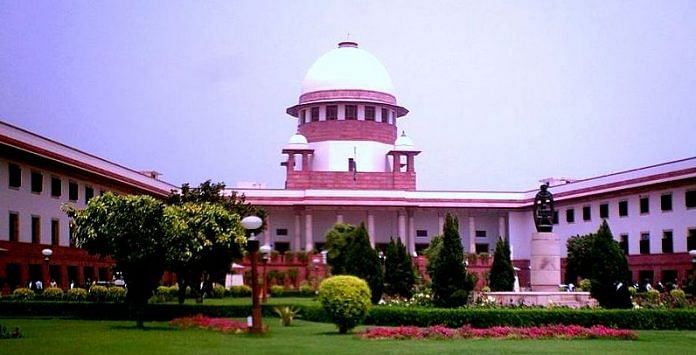Collegium’s decision to supersede Justice Jayant Patel’s elevation to Chief Justice of Karnataka HC is set to be challenged by Gujarat Advocates’ Association.
New Delhi: Two years ago, the Supreme Court went all out to back the collegium system of appointing judges over government interference. Now, it will have to test the historic decision again.
The Gujarat Advocates’ Association is set to move the Supreme Court against the collegium’s decision to supersede former Karnataka High Court judge Jayant Patel’s elevation to the post of chief justice.
Association president Asim Pandya will constitute a two-member panel to draft the petitions to be filed before the apex court.
Patel, the second senior-most judge of the high court, was transferred to the Allahabad High Court instead, following which he resigned in protest. After his resignation last week, advocates in Gujarat and Karnataka went on strike.
Senior advocate Dushyant Dave said: “The [Supreme Court’s] ruling was celebrated in judicial circles in 2015. We will now see if it can stand strong when applied against facts and real circumstances.”
Collegium must walk the talk
In October 2015, a constitution bench of the Supreme Court struck down the National Judicial Appointments Commission (NJAC) and a related constitutional amendment, which proposed a six-member panel, including the Union law minister and two independent persons, to appoint judges to high courts and the Supreme court.
The court had, however, sought suggestions from lawyers, the government, stakeholders and members of the civil society on improving the existing system, under which a group of five senior-most judges of the Supreme Court make appointments to the high courts and the apex court.
“The judge must really enjoy the confidence of the bar to have them come forward and protest. This is very encouraging. Even during NJAC, lawyers were first to talk about internal reforms within the collegium, but it is unfortunate that nothing has changed,” said a senior lawyer, who did not wish to be identified.
The legal fraternity agrees that the collegium must walk the talk on internal reforms, although it is divided over the decision to transfer Patel.
Dave, who has been a vocal critic of the aberrations in judicial appointments, said that “absolutely nothing has changed since 2015”. “In fact, it is becoming more and more clear that the government can arm-twist the collegium. Justice Patel’s is not an isolated case; the collegium has shown a pattern of going against its own guidelines since 1992.”
Senior advocate Arvind Datar, however, cautioned against “declaring the collegium a failure” on the basis of one transfer. “We don’t know the complete facts yet. No one knows why the transfer was made, so we must not jump the gun and impute motives,” he said.
“All these issues will be settled once the MoP (Memorandum of Procedure) is finalised. If there are reasons put on record for transferring a judge, even if they are not disclosed to the public, the debate will end there. But the logjam on MoP should end immediately,” Datar added.
MoP impasse
Datar, along with additional solicitor general Pinky Anand, was part of the apex court-appointed panel which was to compile suggestions to improve the collegium system.
The panel had received an overwhelming 1,500 suggestions, running into 11,000 pages to improve the MoP. It is yet to be finalised as the government and the collegium have been at loggerheads since 2015.
The governent’s law officers – attorney general K.K. Venugopal and Karnataka’s additional solicitor-general Prabhuling Navadgi – declined to comment on the issue.



